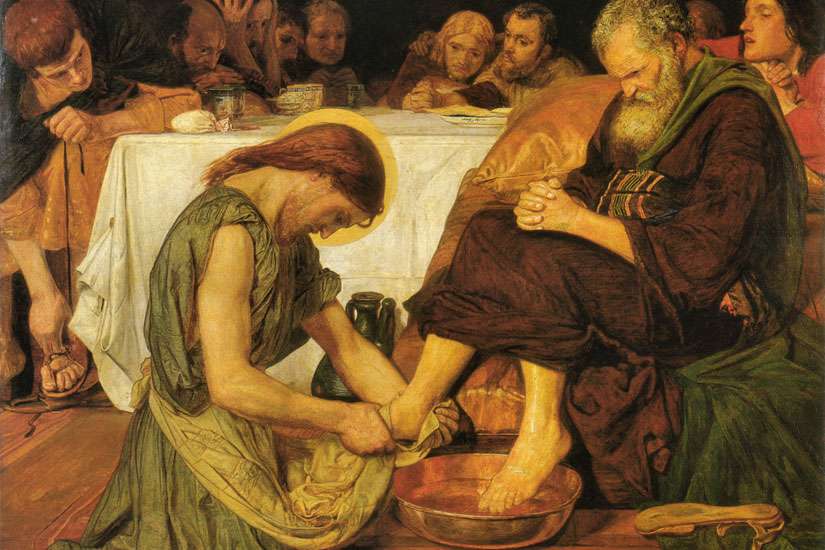I wasn’t keen on it. I felt apprehensive and embarrassed to have someone else wash my foot and to have that person be our own Fr. Mike, whom I have come to respect and admire during his short time in our parish.
But I took the plunge, so to speak, projecting some of the same attitude apparent in Peter’s skepticism. Peter questioned Jesus about washing his feet.
“You will never wash my feet,” said Peter with certitude that Jesus, the master, the teacher, was to be served by His disciples, not the other way around. As was often the case, Peter didn’t get where Jesus was coming from. Most of us fall victim to the same lack of understanding.
When Jesus answered, “unless I wash you, you will have no inheritance with me,” Peter decided to go all in. “Not only my feet, but my hands and head as well.”
Again Peter did not understand what was happening, how Jesus was teaching the disciples that service was to be an integral part of their ministry. Jesus again rebuffed him, saying that anyone who has bathed had no need aside from the foot-washing.
It was Jewish custom to have servants wash the feet of travellers who had been invited into their master’s home. Walking in the dust and dirt in sandals, the cleansing was undoubtedly important. But the job would never fall to the most important member of the group or household. The disciples, lacking understanding and humility, would not consider washing one another’s feet and failed to grasp the significance of what Jesus was doing for them.
Jesus knew His time with the disciples was growing short. He had taught them many lessons but left the great tutorial about humility until the final hours. The disciples had bickered among each other about which one of them was the greater, about who garnered the most favour from Jesus and who would sit where in the kingdom of Heaven.
Jesus knew pride would be the downfall of many. He was aware of the petty arguments. And He knew that if the fledgling Church and the ministry were to survive and flourish the disciples had to learn to serve with humility. Their arrogance would turn them against one another and prevent a proper relationship with God. Proud disciples would not attract people to the new Church but humble and loving disciples would.
Plenty of that humble pie Jesus served the disciples before the Last Supper is left over to nourish us. The families and organizations that are part of our everyday lives often have a hierarchy. Not many of us are keen on getting down and getting dirty to complete the most menial of tasks. But if the lowly tasks aren’t done, the seemingly more important jobs also suffer and the whole organization can fall apart.
Jesus did the foot-washing job that nobody else wanted to do. No one among the disciples doubted that Jesus was their leader and master and yet He was the one who stooped to do the lowly duty.
During Lent and all year round, that lesson of humility is invaluable. How often do we look at others and say, “Let them do the dirty work, I have more important tasks to deal with.”
How often do we look at others and convince ourselves that they are not worthy to visit our homes, not respectable enough to be seen with us? How often do we avoid people because we think their company is not good enough for us or this or that idiosyncrasy of theirs is too annoying to abide?
That was not the path for Jesus and it was not the lesson He taught the disciples. He demanded to be allowed to wash their feet, and demanded that the disciples accept the foot-washing.
The lesson is simple. Serve others, love others, get your hands dirty and get your head out of the clouds. Plant your own feet firmly on the ground and get down to wash the feet of others.
That message was good enough for Jesus. It’s good enough for Fr. Mike. In my humble opinion, it had better be good enough for me, too.
(Campbell is a writer and editor in Halifax, N.S.)


